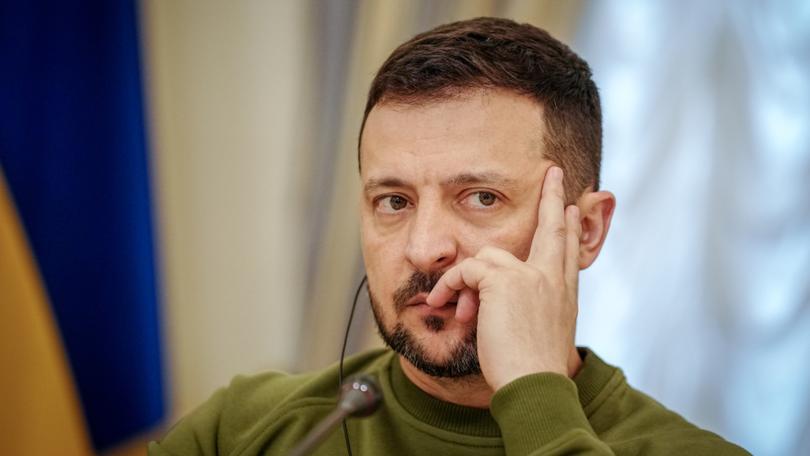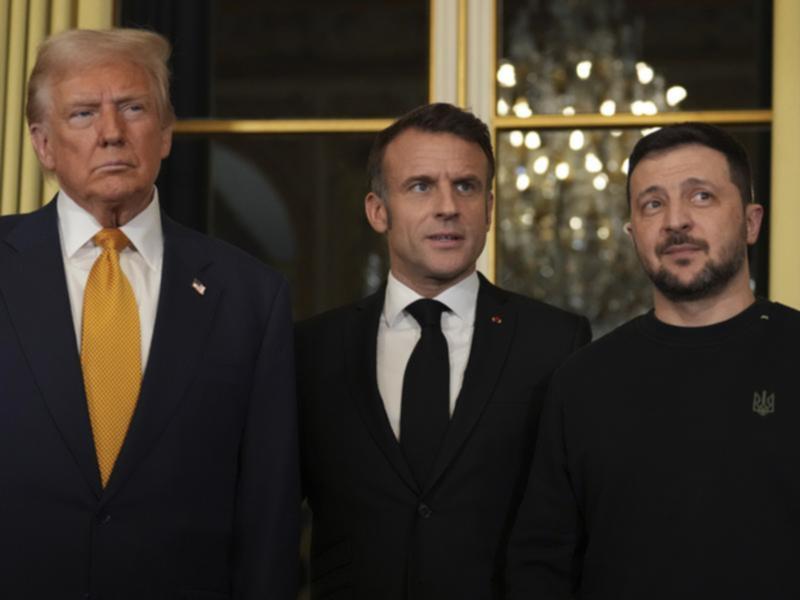THE WASHINGTON POST: Zelensky’s slow shift toward negotiating for Ukraine’s future
The Ukraine president has signaled a greater willingness to negotiate to end the war with Russia.

As Ukrainian forces struggle to hold off Russia’s army on the battlefield and President-elect Donald Trump looks to broker a peace deal, President Volodymyr Zelensky has in recent weeks signaled a greater willingness for negotiations to end the war — a major shift for the Ukrainian leader, who had long vowed to fight for every last inch of his country’s land.
Zelensky’s messaging has been careful; he has not explicitly said Kyiv would agree to concessions — territorial or otherwise — even as Russia occupies more than 20 percent of Ukraine and would probably retain control of that land after any ceasefire.
But after previously stating that negotiations could begin only once Moscow withdrew all its troops, Zelensky is now emphasising the need for long-term security rather than the immediate return of territory.
Sign up to The Nightly's newsletters.
Get the first look at the digital newspaper, curated daily stories and breaking headlines delivered to your inbox.
By continuing you agree to our Terms and Privacy Policy.Zelensky’s change in rhetoric — something Ukrainian and Western officials have noticed — can probably be attributed to a worsening situation on the front line and an incoming US administration that has put future security assistance for Kyiv in doubt.
Ukrainian officials throughout the first year of the war stressed the importance of reclaiming all of Ukraine’s land, including Crimea and other areas Russia has effectively ruled since 2014, as a condition for any deal.
In recent meetings with Trump and European leaders, however, Zelensky has focused more on what he has referred to as “lasting peace” for Ukraine.
The top priority is securing an invite to the NATO military alliance and other security guarantees, such as the possible presence of Western peacekeepers, to prevent future Russian attacks.
Officials and analysts said Zelensky’s tone shift is probably an attempt to be more in line with Trump’s emphasis on halting the conflict. But the Ukrainian leader is also trying to ensure his country doesn’t come out empty-handed.
Zelensky’s administration “understands things are going to change” under Trump, said Michael McFaul, a former US ambassador to Russia who co-chairs the International Working Group on Russian Sanctions with Ukrainian officials.
“I do think for Zelensky, this frees him up from his locked-in position that they were going to fight until the 1991 borders no matter what,” McFaul added.
“He can now say, ‘Well, I would’ve loved to have done that, but Trump has come in and things have changed.’”

In a recent interview with Sky News, Zelensky said the “hot phase of the war” could stop if Ukraine received NATO membership.
The land that Russian forces control could then be returned later “in a diplomatic way,” he said.
The comments marked his most striking acknowledgment yet that Kyiv would consider at least temporarily ceding territory.
But NATO diplomats said an invitation to the Western military bloc remains a distant prospect because of misgivings among and political uncertainty in member nations allied with Ukraine, including the United States and Germany, and objections from other members, such as Kremlin-friendly Hungary.
A senior NATO diplomat said Zelensky cannot back down from the demand for Western security guarantees despite the reluctance among key allies.
“From a Ukrainian perspective, it’s completely logical to push the issue because, of course, if you’re Ukrainian, the only security guarantee that you really attach value to is NATO membership. So he will do everything to push that. Can’t blame the guy for that,” the diplomat said.
Like others cited in this article, the official spoke on the condition of anonymity to discuss a sensitive security matter.
Ultimately, most doubt that Russian President Vladimir Putin is ready to negotiate while his troops are making gains on the front line despite heavy casualties. Some officials speculate that Zelensky is wisely hedging and hoping his more amenable posture will endear him to Trump’s White House and leave it open to providing more support for Ukraine’s defense if Putin rejects talks.
“I put myself in his shoes, and what else is he supposed to do?” a senior Ukrainian official said. “Should he tell Trump and America that we don’t need their help and we’ll just do it our way? I think he’s handling it perfectly.”
Kyiv’s European allies are also contending with a changing reality and trying to shape the outcome. They have sought to increase support for Ukraine, worried that Trump’s return could mean diminished US funding and that Kyiv’s position for talks is too weak at this time.
And policymakers across Europe are discussing further boosting spending on their own defense, as NATO Secretary General Mark Rutte warned that allies must “shift to a wartime mindset” and spend much more on defense to remain ready to counter any threats from Russia in the coming years.
“The first step we have to take is for Zelensky to be able to negotiate from a position of strength. And at the moment, the front line is moving westwards, not eastwards,” Rutte told reporters last week.
“He doesn’t need more plans, he needs ammunition.”
Putin, meanwhile, has stuck to his maximalist position: an effective Ukrainian capitulation.
In June, he spelled out his conditions for peace talks, demanding that Ukraine hand Moscow permanent sovereignty over four regions that Russia claimed to annex in 2022 — Donetsk, Luhansk, Zaporizhzhia and Kherson, as well as Crimea.
That would involve Kyiv surrendering more territory to Russia, because Russian forces don’t fully control those regions.
Putin has insisted on Ukraine repudiating NATO membership permanently. In a marathon news conference Thursday, he also referenced Russia’s demands in the talks between the two sides in Istanbul during the first months of the war, which called for significantly reducing the size of Ukraine’s military.
Zelensky’s emphasis on security guarantees stems from a deep mistrust of Russia and concern that if the fighting stops now, Putin could just invade again in a few years — as he did in 2022, eight years after illegally annexing Crimea.
A ceasefire without a long-term objective would give Russia an opportunity to replenish its military ranks and weapons stocks, Ukrainian officials said.
With NATO membership appearing unlikely, European allies have floated alternative solutions, such as a peacekeeping force, which Zelensky has been open to.
But Ukrainian officials maintain that is not an acceptable consolation prize for not being in granted NATO membership.
Zelensky said after talks in Brussels on Thursday that European guarantees alone would not be sufficient without a “common decision” and a US role.
“It is very important for us to have both on board, the United States and the Europeans,” he said.
Ukraine has already signed security pacts with individual countries, but analysts and officials acknowledged that the pacts might not be honored in the future.
“They’re not binding, and they’re not treaties,” McFaul said. “It’s a worrisome thing.”
The senior Ukrainian official said they are “starting to believe” that the war could indeed end next year as talk of a peace deal has picked up since Trump’s election. But if not for all the sudden public talk of a peace settlement, “I wouldn’t believe we’re anywhere close to negotiations,” the official said. “I just don’t think it’s possible to come to any agreement with Putin.”
- - -
David L. Stern in Kyiv and Robyn Dixon in Riga, Latvia, contributed to this report.
© 2024 , The Washington Post
